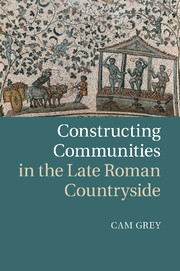Book contents
- Frontmatter
- Contents
- Preface
- List of abbreviations
- Map The late Roman world (sites and regions discussed in the text)
- Introduction
- Chapter 1 Constituting communities
- Chapter 2 What really matters
- Chapter 3 Small politics
- Chapter 4 Power as a competitive exercise
- Chapter 5 Resistance, negotiation, and indifference
- Chapter 6 Creating communities
- Chapter 7 Unintended consequences
- Conclusions
- Bibliography
- Index
Chapter 7 - Unintended consequences
taxation, power, and communal conflict
Published online by Cambridge University Press: 07 September 2011
- Frontmatter
- Contents
- Preface
- List of abbreviations
- Map The late Roman world (sites and regions discussed in the text)
- Introduction
- Chapter 1 Constituting communities
- Chapter 2 What really matters
- Chapter 3 Small politics
- Chapter 4 Power as a competitive exercise
- Chapter 5 Resistance, negotiation, and indifference
- Chapter 6 Creating communities
- Chapter 7 Unintended consequences
- Conclusions
- Bibliography
- Index
Summary
The tax system of the late Roman world does not appear to have fundamentally reshaped rural socio-economic relations in the late Roman period. Rather, it was modeled upon networks of mutual obligation and alliance that already existed. The novelties introduced under the auspices of the new tax system interacted with those networks, and in some circumstances created new relationships and connections between participants. By means of the origo, the Roman state sought to identify clearly or create ex novo a multitude of overlapping collectivities, which could be held mutually responsible for proportions of a municipality’s total tax burden. Those collectivities might involve individuals of quite different wealth and status, as in the case of registered tenants and their landlords; or they might be comprised of individuals whose circumstances were relatively similar, such as we might imagine the proposed purchasers of patrimonial estates mentioned in an early fifth-century law. In each case, these new configurations are likely to have created or fostered asymmetrical and symmetrical relations between their participants. Consequently, the opportunities available to small agriculturalists for managing their subsistence and social risk will have increased, and those small agriculturalists were not slow to exploit these opportunities. In what follows, I explore both the intended objectives of the state in creating tax collectivities and ensuring that their members be held mutually responsible for their fiscal burdens, and a series of unintended consequences of those actions.
Tenancy, patronage, and the payment of taxes
The close connection between tenancy and patronage in the understanding of both the powerful and the relatively powerless was emphasized in a previous chapter, where a blurring of the boundary between the two in the period was sketched. The legal sources reveal that the state attempted to exploit this partial merging of patronage with tenancy for its own fiscal purposes. A number of interconnected strategies are visible. First, there survives legislation which attempts to foster a relationship of patronage between large landowners and a variety of undesirable or threatening elements, by mandating the creation of an arrangement of tenancy between the two. A law addressed to the Prefect of the City of Rome, for example, directs that any beggars discovered to be sound of body and of robust years, and therefore to be begging illegitimately, should be given over to their denouncers in an arrangement of colonatus perpetuus, or perpetual tenancy. At base, the law seems to be responding to a fear among the urban aristocracy of the threat posed by the unknown, unknowable urban mob, and a desire to neutralize that threat by attaching them to a member of the city’s landowning aristocracy. Skepticism as to the practicality, effectiveness, and enforceability of such a law is warranted, but it reveals nevertheless an expectation that a relationship of tenancy will necessarily carry with it some measure of personal responsibility on the part of the landlord for the actions of his tenant.
- Type
- Chapter
- Information
- Constructing Communities in the Late Roman Countryside , pp. 198 - 225Publisher: Cambridge University PressPrint publication year: 2011

